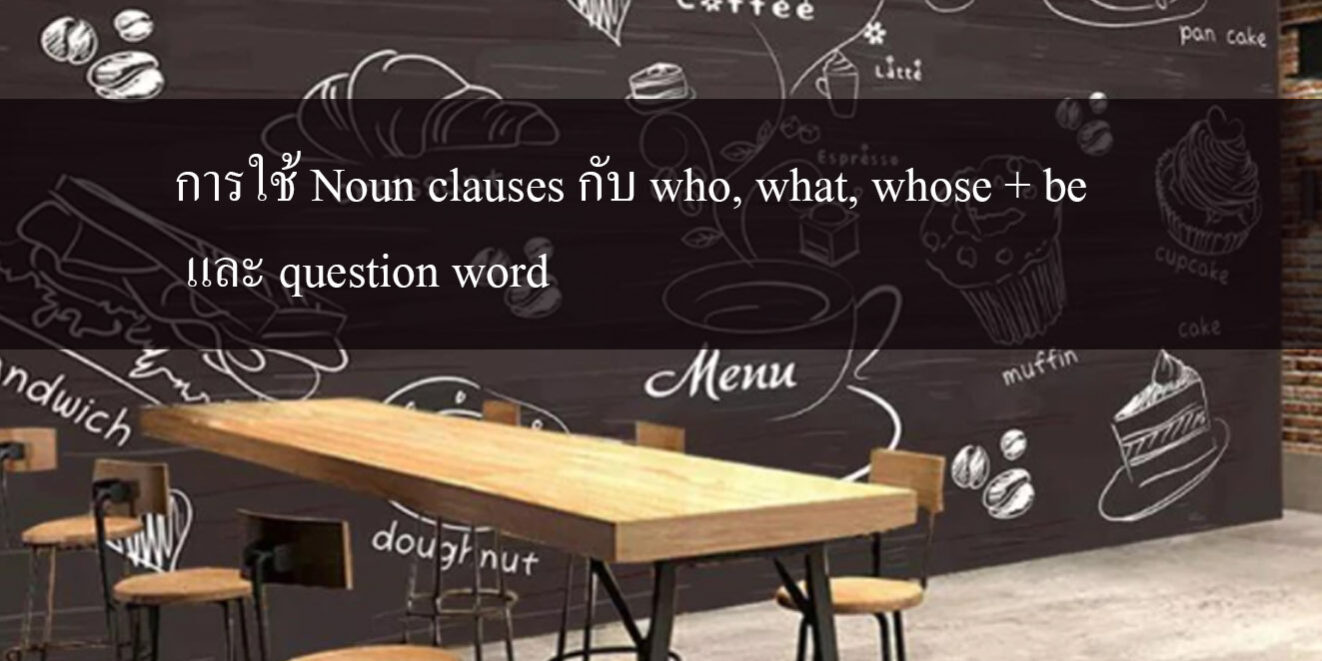การใช้ NOUN CLAUSES : Noun clauses กับ who, what, whose + be
Wh -words
noun clause ที่นำหน้าด้วย wh -words อยู่ในตำแหน่งของคำนามในประโยคได้ทุกตำแหน่ง
Object: She told me how I could raise more money for charity.
Indirect object: The man enjoyed explaining his theory to whoever was interested in it.
Object of a preposition: The question of when the election will be held will be answered by the Election Committee tomorrow.
Subject complement: You are what you eat .
wh-words ที่ใช้นำหน้า noun clause จะมีหน้าที่บางประการใน noun clause ดังนี้
who, whoever, whom, whomever ทำหน้าที่เป็นประธานและกรรมใน noun clause
– Whoever wins must treat us to lunch.
– I want to know who he has chosen to marry .
whose คำนามที่ตามหลัง whose ทำหน้าที่เป็นประธาน กรรม กรรมตามหลังบุพบท และส่วนเสริมประธาน ใน noun clause
– I asked whose money was stolen.
– Tell me whose book you are reading.
– John doubted in whose house Jane lives.
– I want to know whose book this is.
– I’m afraid of what will happen after that.
– I want to know what her name is .
– You should give him whatever he likes .
which, whichever มักมีคำนามตามหลัง โดยทำหน้าที่เป็นประธานและกรรมใน noun clause
– I don’t know which brand is worth buying.
– It’s half price for whichever book you buy.
– You can choose whichever you like.
where, when, why, how ทำหน้าที่เป็นคำกริยาวิเศษณ์ ใน noun clause
:: where, wherever บอกสถานที่
– Where he will stay has yet to be decided.
– You should ask him where he wants to stay .
– Wherever you go is the right place for me.
:: when, whenever บอกเวลา
– You must find out when he is due to arrive at the airport .
– We are interested in when the conflict will be resolved.
– I don’t care whenever he does that .
:: why บอกสาเหตุหรือเหตุผล
– Why he went to China was not known.
– Nopadol told the teacher why he could not finish his assignment .
:: how บอกกิริยาอาการ
– Describe how you felt at that time .
– How he was involved in the scandal needs to be investigated.
การใช้ NOUN CLAUSES : Noun clauses ที่ขึ้นต้นด้วย question word
– I hope you pass the exam.
ประโยคเต็มที่เป็นทางการ คือ
– I think that you’re very pretty.
– I hope that you pass the exam.
Subject Noun Clauses
(มักใช้ในภาษาเขียนหรือภาษาทางการ)
ที่ว่าคะแนนลดลงเป็นสิ่งที่เห็นได้ชัดเจน
สิ่งที่เขาพูดทำให้พวกเราสับสนมาก
Object Noun Clauses
ผมรู้สึกว่าคุณประมาณการความเสียหายเกินความเป็นจริง
– I don’t know where she is.
ผมไม่รู้ว่าเธออยู่ที่ไหน
ประเภทของ Object Noun Clauses
2. Noun Clauses ที่ขึ้นต้นด้วย “Wh-Words” (หรือ Question Words)
3. Noun Clauses ที่ขึ้นต้นด้วยคำว่า “if” หรือ “whether”
She knows that her mom loves her.
เช่น I think that it’s red, not blue. (ภาษาทางการ)
I think it’s red, not blue. (ภาษาพูด)
เช่น I believe it’s raining. (now)
I believe it’ll rain. (very soon)
I believe it rained. (a moment ago)
เช่น Surat: Is Surawee here today?
Dendao: I think so.
(คำพูดเต็มๆก็คือ I think that Surawee is here today.)
Sompet: I don’t believe so.
(คำพูดเต็มๆก็คือ I don’t believe that the rain has stopped.)
Paa: I’m afraid not.
(คำพูดเต็มๆก็คือ I’m afraid that we are not ready to leave.)
(ไม่ใช่ why does he come home very late)
(ไม่ใช่ when will he arrive)
(Main clause เป็นคำถาม)
I’m wondering where the elevators are.
(Main clause เป็นบอกเล่า)
3. ใช้ Noun Clauses ที่ขึ้นต้นด้วย Wh-Words เพื่อแสดงให้คู่สนทนาทราบว่า เราไม่รู้ หรือเราไม่แน่ใจ
เช่น I don’t know how much it costs.
I would like to know when our next meeting will be.
I’m not sure which house is his.
Can you tell me what time the show starts?
เช่น Direct Question: Did they pass the exam?
Indirect Question: I don’t know if they passed the exam.
(ข้อความที่ขีดเส้นใต้คือ noun clause ที่ขึ้นต้นด้ว if นั่นเอง)
เช่น I can’t remember if I had already paid him.
I wonder whether he will arrive in time.
เช่น Do you know if the principal is in his office.
Can you tell me whether the tickets include drinks?






